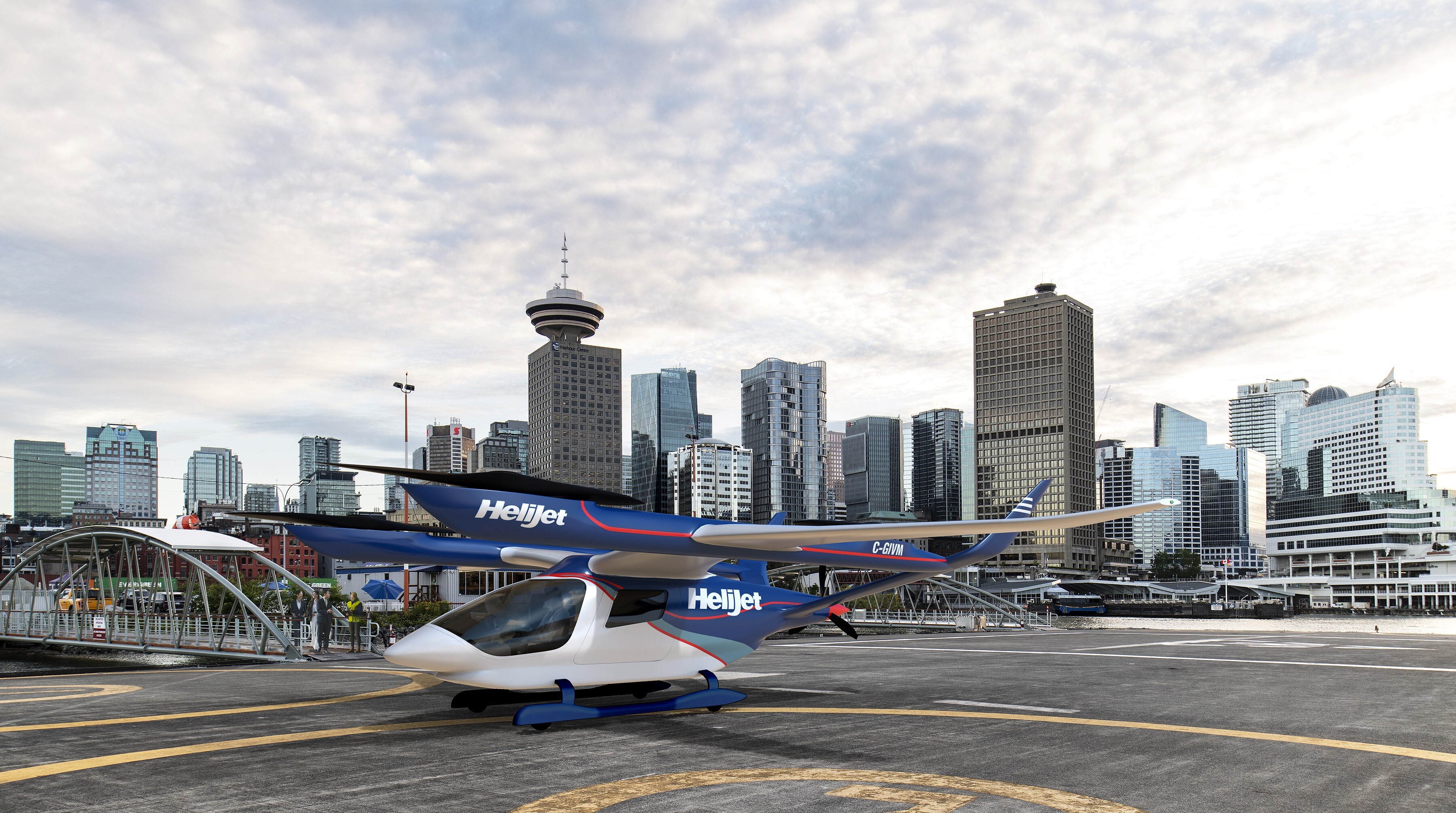Helijet has placed orders for Beta Technologies’ Alia 1-pilot, 5-passenger eVTOLs and that it would operate the aircraft under IFR flight rules. Beta indicated that the Alia would be certified by 2026 and Helijet would begin operations shortly thereafter.
The parties made the announcement on Tuesday afternoon at Helijet’s Victoria Harbour Heliport, later confirming that the deal covers four firm orders and options for four more aircraft. They were joined by a representative from the Canadian Advanced Air Mobility (CAAM) consortium and British Columbia Premier David Eby. During the announcement, Eby reiterated his province’s commitment to its long-standing carbon fuel tax and said that there would be continued provincial and federal support for companies investing in carbon-reducing technologies and related infrastructure.
British Columbia implemented North America’s first carbon tax in 2008 and raised it from $50 to $65 per tonne of carbon dioxide emissions earlier this year in line with the minimum federal carbon tax rate. That rate will steadily increase in the coming years. It translated into an additional tax of 49 cents (Canadian) per gallon on Jet-A fuel in 2022 and will rise to $1.08 by 2026. The province also provides grants for businesses switching to the use of greener energy under its CleanBC industry Fund which already has paid C$310 million to participating businesses and will pay another C$282 million between 2022 and 2025.
Helijet CEO Danny Sitnam said the Alia aircraft would create the opportunity to broaden the company’s passenger service network in the Vancouver area by linking its legacy helicopter service to vertiports and vertipads served by the eVTOL network in outlying areas akin to an airline “hub and spoke” network. Helijet currently operates a fleet of Sikorsky S-76 helicopters for both scheduled passenger and charter service. It sees the Alia eVTOL vehicle as a way to expand not only passenger services but also emergency response, air ambulance and organ transfer flights.
"This provincial government recognizes the potential of advanced air mobility to decarbonize the aviation sector, improve regional connectivity, improve emergency response times, and introduce new manufacturing opportunities in our province," Eby commented. "We congratulate Helijet on their exciting news and look forward to British Columbia becoming a leader in the advanced air mobility sector.
The Alia has a range of 250 nm and a top speed of 100 knots. Sitnam also said that the aircraft held the promise of reducing the cost of human organ transport and high-value medical supplies in the region including locally-produced radioactive isotopes.
Vancouver to Get First Vertiport
Helijet is also leading the development of Canada’s first commercial vertiport at its downtown Vancouver waterfront heliport, which would connect AAM users to an intermodal transportation hub providing road, marine, air, and rail access throughout the region. The company acknowledged that it has shortlisted three other eVTOL aircraft as possible additions to its fleet and it has not ruled out placing orders with other manufacturers.
The operator joined the CAAM, which now has more than 100 member organizations, in 2019. Other stakeholders in this group include the National Research Council of Canada, Air Canada Cargo, CAE, Iskwew Airlines, InDro Robotics, the University of British Columbia, TransLink, British Columbia Aviation Council, the University of Victoria, the British Columbia Ministry of Transportation, Telus, Transport Canada, the Canadian Hydrogen and Fuel Cell Association, and the Aerial Evolution Association of Canada.
Founded in 2017, Beta has orders from customers including UPS, Air New Zealand, Blade, and United Therapeutics, as well as contracts with the U.S. Army and Air Force. It is developing both eVTOL and electric conventional takeoff and landing versions of its aircraft.
Beta is exploring options for establishing an industrial base in Canada. It has already established a research and development facility at Montréal's Pierre Elliott Trudeau International Airport in Quebec, which is close to its headquarters in Vermont. The company recently conducted what is believed to be the first cross-border eVTOL flight when it flew a prototype from the U.S. to Montreal.
